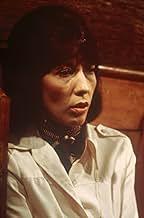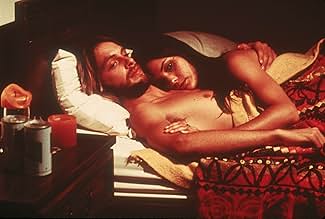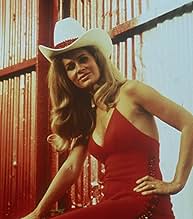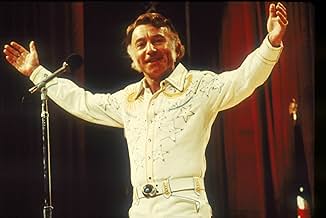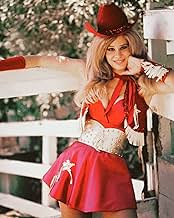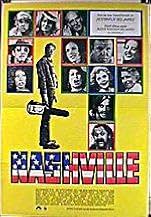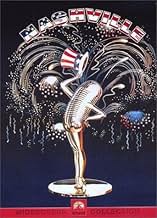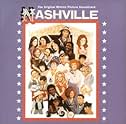Nel corso di alcuni giorni frenetici, delle persone interconnesse si preparano per un congresso politico.Nel corso di alcuni giorni frenetici, delle persone interconnesse si preparano per un congresso politico.Nel corso di alcuni giorni frenetici, delle persone interconnesse si preparano per un congresso politico.
- Regia
- Sceneggiatura
- Star
- Vincitore di 1 Oscar
- 23 vittorie e 25 candidature totali
- Wade
- (as Robert Doqui)
- Bill
- (as Allan Nicholls)
Recensioni in evidenza
According to the movie trailer available on the DVD release, NASHVILLE is "the damnedest thing you ever saw"--and a truer thing was never said, for it is one of those rare film that completely defies description. On one level, the film follows the lives of some twenty characters over the course of several days leading up to a political rally, lives that collide or don't collide, that have moments of success and failure, and which in the process explore the hypocrisy that we try to sweep away under the rug of American culture. If it were merely that, the film would be so much soap-opera, but it goes quite a bit further: it juxtaposes its observations with images of American patriotism and politics at their most vulgar, and in the process it makes an incredibly funny, incredibly sad, and remarkably savage statement on the superficial values that plague our society.
What most viewers find difficult about NASHVILLE--and about many Altman films--is his refusal to direct our attention within any single scene. Conversations and plot directions overlap with each other, and so much goes on in every scene that you are constantly forced to decide what you will pay attention to and what you will ignore. The result is a film that goes in a hundred different directions with a thousand different meanings, and it would be safe to say that every person who sees it will see a different film.
In the end, however, all these roads lead to Rome, or in this case to the Roman coliseum of American politics, where fame is gained or lost in the wake of violence, where the strong consume the weak without any real personal malice, and where the current political star is only as good as press agent's presentation. For those willing and able to dive into the complex web of life it presents, Altman's masterpiece will be an endlessly fascinating mirror in which we see the energy of life itself scattered, gathered, and reflected back to us. A masterpiece that bears repeated viewings much in the same way that a great novel bears repeated readings. A personal favorite and highly, highly recommended.
Gary F. Taylor, aka GFT, Amazon Reviewer
The ending is astonishing, tidying up some plot lines and leaving others open ended. A star is born when the Albuquerque character and a gospel group minus its leader belt out a Nashville standard, "It Don't Worry Me." The Sueleen Gay character, meanwhile, suffers one final indignity; Albuquerque, on the same stage and with the same ambitions, achieves the fame that might have gone to Sueleen, a waitress/stripper/wanna-be recording artist, had Sueleen gotten the microphone first.
We never know what caused the Kenny Frazier character to crack; perhaps like Mark David Chapman (John Lennon) he was obsessed with the Holden Caulfield character in "Catcher in the Rye," although we can feel fairly certain that he did not share John David Hinckley's (President Reagan) obsession with Jodie Foster since "Taxi Driver" would not be released for another year.
Watching "Nashville" for the first time, you may feel protective of Barbara Jean's character for reasons you can't immediately explain but will learn all too well. I feel the same urge to shout at the screen, warning her character of possible danger, that I experienced in "From Here to Eternity," knowing that Pearl Harbor was imminent and would change everything.
Characters transform before our eyes. Del Reese (Ned Beatty), bored with his marriage to a Nashville superstar and as a father to hearing-impaired children, cares enough at the end to lead a wounded Haven Hamilton to safety. Hamilton (masterfully played by Henry Gibson) would stomp anyone in his path to create a hit record but is the first to care for Barbara Jean in her moment of need.
Sure, some of the songs are terrible -- some country music is terrible -- but could anything be more poignant than Barbara Jean's rendition of "My Idaho Home" or Keith Carradine singing "I'm Easy" in a nightclub where four of his conquests look on equally with lust and bewilderment. Country singers, like stock-car drivers, inspire tremendous loyalty and jealousy among their fans, which Altman depicts beautifully when Scott Glenn, a devoted fan of Barbara Jean, leaves the Opry as Connie White appears to sing a tribute to her ailing rival. Hamilton's character is never better than when between songs he asks listeners to send Barbara Jean a card and "tell her that Haven told you to write."
Altman would rate among the greatest directors -- as the American Fellini -- if this were his only effort. Despite its convoluted plot structure, "Nashville" achieves greatness and searches for truth. If the 1970s shaped your life in any respect, this is a movie experience not to be missed.
In fact, one could argue, the film's even more relevant today in this age of celebrity-worship and apathetic, gutless American media who believe missing suburban wives are more pertinent and crucial to this nation's well-being than questioning facts and our leaders' motives for waging a needless, costly war.
The film's about the politics of country music, families, stardom, search for stardom, political manipulation and populist political candidates. The unseen presidential candidate's spiel in "Nashville" could easily have been sound bites from contemporary populists; he could be seen as the cinematic trend-setter for the Ross Perots, Jesse Venturas, Howard Deans and Ralph Naders.
The film is at once a political drama, musical and documentary all effortless woven together by a master storyteller, who truly is an American treasure. In "Nashville," Altman's overlapping dialogue works to perfection as he captures this panoramic view of five days in Nashville through the eyes of two-dozen characters.
With so many characters, it's Altman's genius that he keeps this an engrossing character study. Although he tosses aside all conventions of narrative storytelling, we get to know characters better in "Nashville" than we do in many contemporary dramas with fewer characters. There's Ronee Blakley's country singer; Lily Tomlin's doting housewife and mother; Scott Glenn's caring soldier; Keith Carradine's lecherous pop star; Ned Beatty's disinterested father; Keenan Wynn's loving husband; Michael Murphy's sleazy campaigner; and Gwen Welles' sad wannabe country singer, whose scene at a political fund-raiser is heartbreaking. And Jeff Goldblum's motorcyclist and Geraldine Chaplin's Opal are the threads that weave through all the lives in this marvelous tapestry.
There are plenty of terrific songs in "Nashville" - some might complain too many - but the best are Carradine's Oscar-winning "I'm Easy" and "It Don't Bother Me." They add to the nice sense of cynicism that layers the movie.
Altman's one of the big reasons the 1970s is regarded as the greatest decade of American filmmaking. Look at just a few of his contributions in that decade - "Nashville," "MASH" (1970), "Brewster McCloud" (1970), "McCabe and Mrs. Miller" (1971), "Images" (1972) and "The Long Goodbye" (1973). His films also influence other talented filmmakers, including Alan Rudolph (who worked on Altman films) and Paul Thomas Anderson, whose storytelling style - "Boogie Nights" (1997) and "Magnolia" (1999) - clearly is Altman-inspired.
Altman and writer Joan Tewkesbury created a mosaic to explore and provoke. NASHVILLE may be set against the worlds of politics and country music, but, it really isn't about either. It's about a nation that is divided along many lines right down to the individual.
The massive cast (24 'main' characters) includes supreme turns by Lily Tomlin, Ronee Blakely, Ned Beatty, Henry Gibson, Karen Black, Keith Carradine, Gwen Welles and more.
In a decade where Altman also made MASH, MCCABE AND MRS. MILLER and THE LONG GOODBYE he stood as tall as anyone of that era.
Lo sapevi?
- QuizThe film was very much improvised by the actors and actresses, who used the screenplay only as a guide. They spent a great amount of their time in character, and the movie was shot almost entirely in sequence.
- BlooperWhen attempting to interview Tommy Brown, Opal says that she is from the BBC. When questioned, she explains that this stands for the British Broadcasting Company. It actually stands for the British Broadcasting Corporation. This was intentionally done to insinuate that Opal doesn't actually work for the BBC and was an impostor. Geraldine Chaplin confirmed this in a 2000 interview in Premiere magazine.
- Citazioni
Hal Phillip Walker: Who do you think is running Congress? Farmers? Engineers? Teachers? Businessmen? No, my friends. Congress is run by lawyers. A lawyer is trained for two things and two things only. To clarify - that's one. And to confuse - that's the other thing. He does whichever is to his client's advantage. Did you ever ask a lawyer the time of day? He told you how to make a watch, didn't he? Ever ask a lawyer how to get to Mr. Jones' house in the country? You got lost, didn't you? Congress is composed of five hundred and thirty-five individuals. Two hundred and eighty-eight are lawyers. And you wonder what's wrong in Congress? No wonder we often know how to make a watch, but we don't know - the time of day.
- Curiosità sui creditiThe Paramount logo is in black and white and the image looks shaky. The scratchy effect was reportedly achieved when director Robert Altman took the negative with the logo on it, threw it onto the ground, and stomped on it.
- ConnessioniFeatured in Precious Images (1986)
- Colonne sonoreIt Don't Worry Me
Music and Lyrics by Keith Carradine
Performed by Barbara Harris
Lions Gate Music Co. / Easy Music (ASCAP)
I più visti
- How long is Nashville?Powered by Alexa
Dettagli
Botteghino
- Budget
- 2.200.000 USD (previsto)
- Lordo Stati Uniti e Canada
- 9.984.123 USD
- Lordo in tutto il mondo
- 9.995.876 USD
- Tempo di esecuzione2 ore 40 minuti
- Colore
- Proporzioni
- 2.35 : 1
Contribuisci a questa pagina



